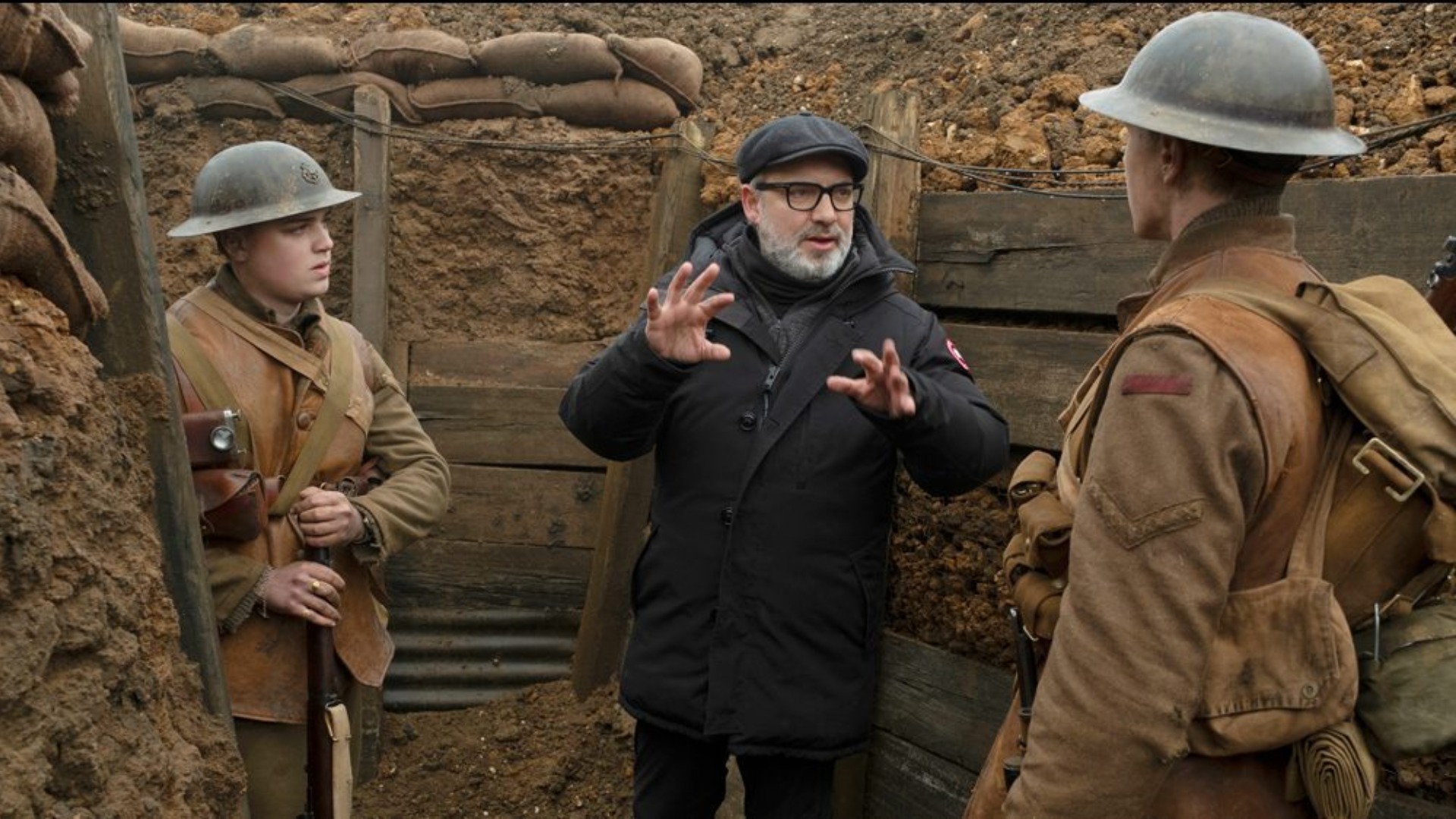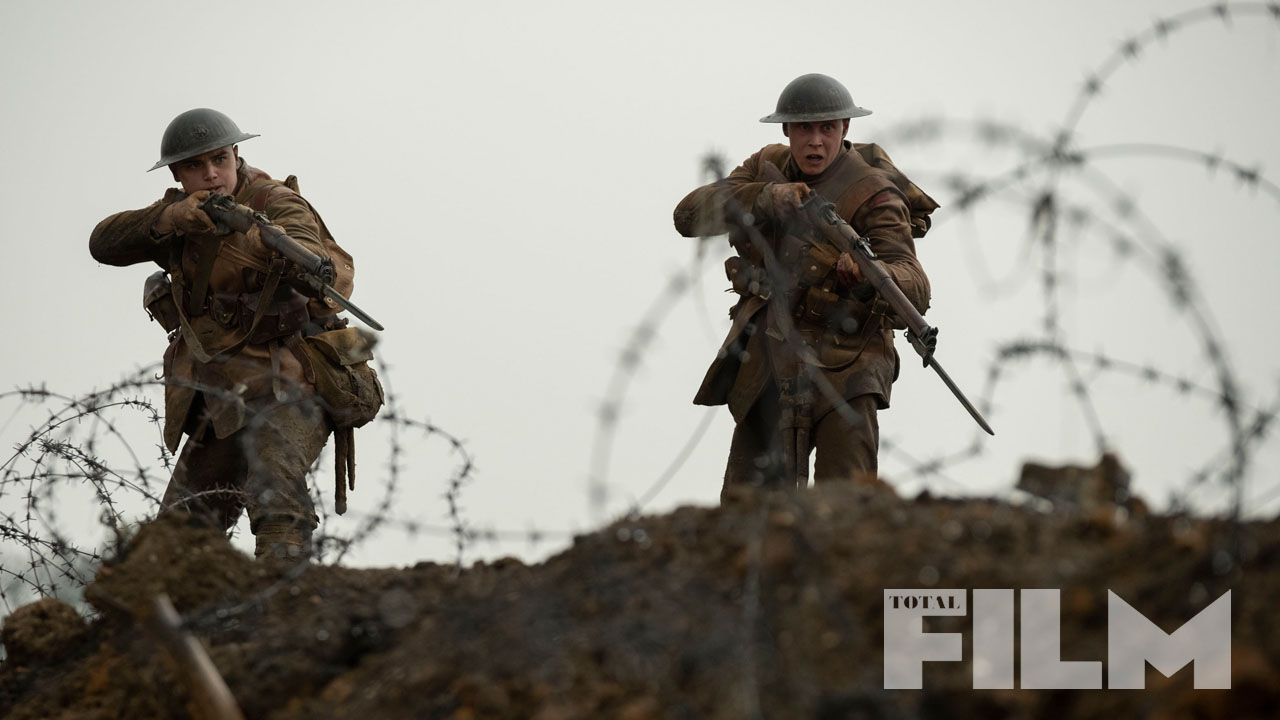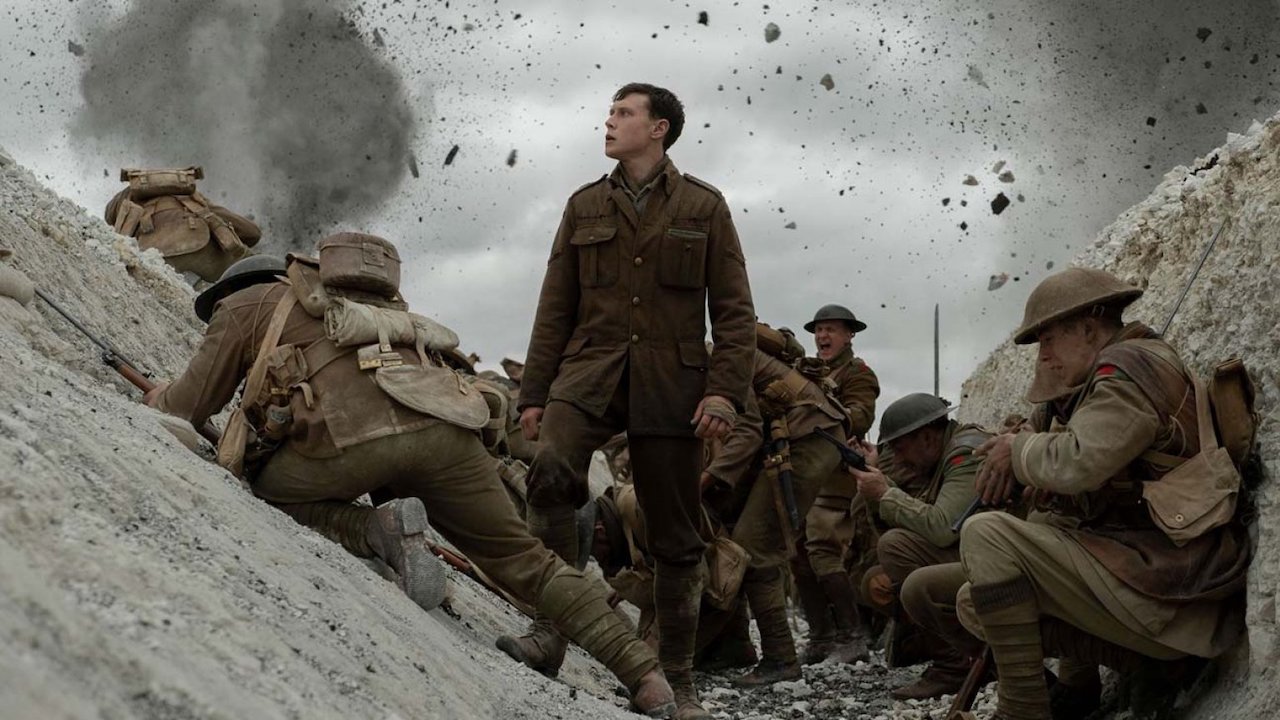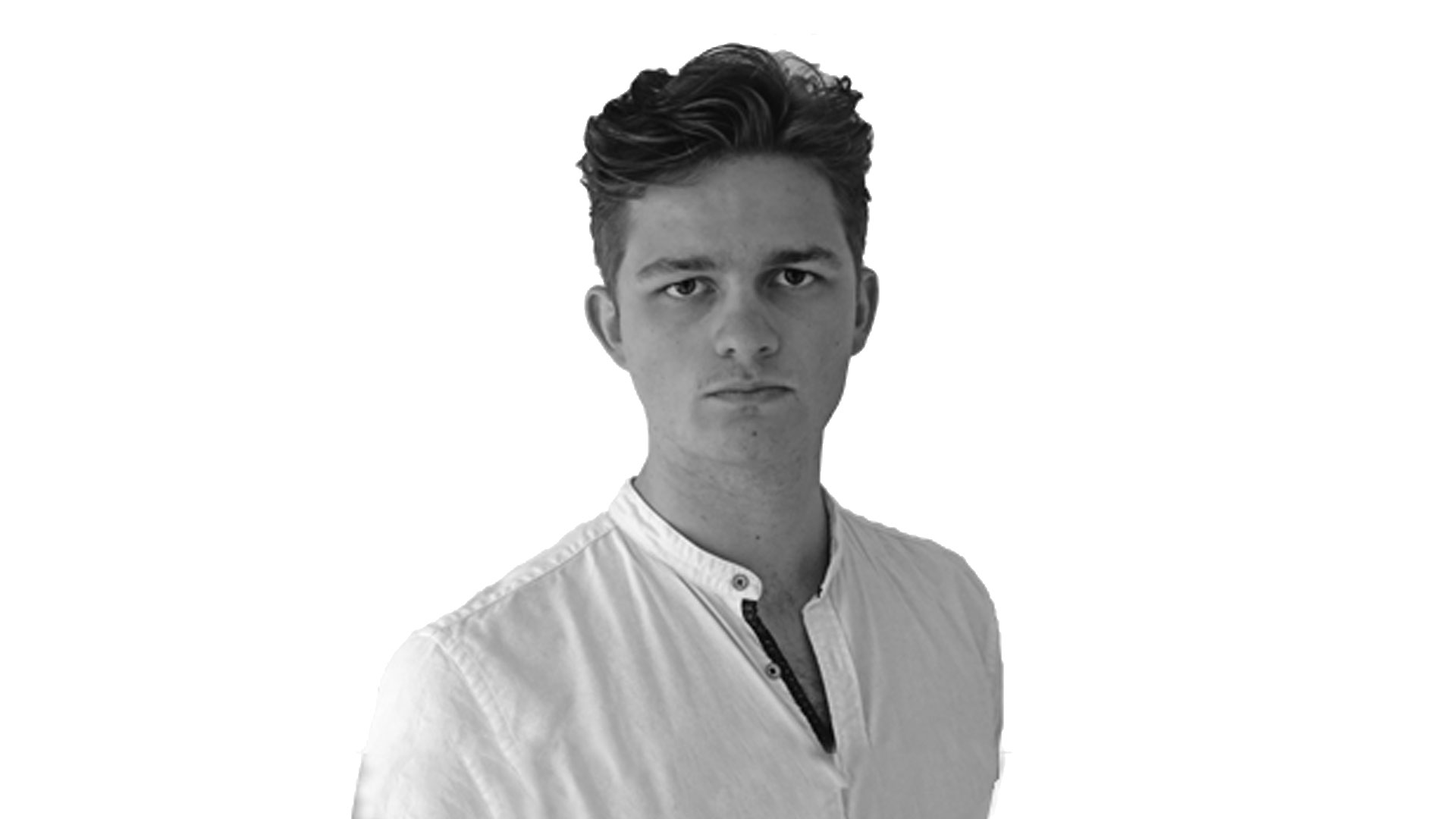1917 director Sam Mendes on how Spectre gave him the confidence to helm a "one-shot" war movie
Sam Mendes on 1917: "You definitely felt like the movie was emerging as we were shooting"

There's a reason 1917 has quickly become the favourite to win the Oscar for Best picture. Sam Mendes' World War One epic – which has been edited to look as if it were shot on one take – is a mesmerising and immersive experience that deserves to be on a the biggest screen possible. Such is the phenomenal technical achievement that the movie has already won a Golden Globe for Best Drama Picture and picked up a BAFTA nomination.
GamesRadar+ and Total Film sat down with Mendes to discuss 1917, which centres on two British soldiers – played by George MacKay Dean-Charles Chapman – as they traverse No Man's Land to deliver a message to a group of infantry about to embark on a mission based on misinformation. Colin Firth, Benedict Cumberbatch, Andrew Scott, and more well-known actors also have cameo roles in the movie.
Read the full Q&A below or listen to the interview on the Inside Total Film podcast.

GR+: You spoke to Total Film last year about 1917, and said how doing the one-shot at the opening of your last James Bond movie, Spectre, gave you the confidence to do an entire movie in one-shot. What did you learn from that experience?
Sam Mendes: We worked it out at great length beforehand. Initially, I had the idea to do the whole opening sequence as one shot. And I got to the point where I thought, “This is becoming self-defeating, I have to cut here to tell the story better.” So what I learned was, if I ever get to that point on this film, then I have to go back and rewrite it so that I don't need to cut. I never wanted to be in a situation where I thought, “Damn, if only I could cut would be better.” I wanted to make sure that that never happened.
There must be frustrations that come with one take, because whatever you've scripted, that's what's going to be in the film. There's no cutting around. Was there anything where you were frustrated at yourself for writing something a certain way? How do we get around that? Was it just rewriting the scenes over and over again?
It wasn’t just rewriting, it was also about writing it in a sort of space at the same time. Roger Deakins and I were just sitting there talking about where and how the camera would move for days and days. Even though we were scratching our head about a number of sequences, by the time we came to shoot them, I felt we found a solution. We made very, very few adjustments to camera by the time we came to shoot, partly because we'd rehearsed everything, shot a lot of it in rehearsal, and thought about it for months beforehand. But there were several scenes which confounded us, for weeks really.
Sign up for the Total Film Newsletter
Bringing all the latest movie news, features, and reviews to your inbox
No Man's Land was really, really hard. That doesn't exist, you have to invent the events of No Man's Land – how the land falls? What are the details that are going to sustain you? How the camera reads their reaction to what they are seeing around them. And where we see just them aware, we see what they're seeing all of those things. That was a dance that took a while to choreograph. Going across the canal in the French town that, for some reason, really took us a long time, to find the right way to do it so he didn't seem like some kind of action hero or somebody who suddenly goes from being a private with little or no army training to being Rambo. Those things, trying to get the tone of it right, that that took a long time.
The film is so gritty and realistic, and then you have soldiers being soldiers as well. The technical feat is phenomenal, but it also seems like it harkens back to your days and on the stage and in theatre where – to put it crudely – that was always one take every night. Did you feel like you were revisiting those skills, and using that muscle memory
Yeah, and I do think that people treat it differently in movies. I remember when Anne Hathaway won the Oscar for Les Mis and everyone said, “My God, she does that song in one shot.” And I remember thinking, “Unless I'm not mistaken, the entire cast of Les Miserables does it in one take live on stage every night – you can buy a ticket.” So it doesn't seem so strange to me that people do this in these one long takes. I'm very used to rehearsing with loads of actors for weeks and then saying on the first preview, “Right, off you go, I'll see you two hours when the story's over, and we'll talk about how it how it went.”
So that wasn't unfamiliar. Nor was it unfamiliar to judge the shape of a story, the rhythm of the story, tempo of the story, without any cuts. That's something I do all the time in theatre. But on the other hand, it was completely unlike theatre, more so than almost any other movie, because we were constantly on the move and the landscape of the light and the conditions were constantly changing. On the other side of it, it felt very cinematic and as if the camera was expressing things that weren't always being said, in a way that couldn't be the case on stage.

What were the touchstone films that you look at how, while working on this, did you kind of did you watch the Rope a few times?
No, I didn't watch Rope again. I haven't seen Rope in years. I think even Hitchcock himself thought it was not entirely successful. So, no. It seemed to behave in a quite a different way to most films. Roger Deakins and I have sat down a lot in the past and looked at movies that are directly relevant to the films we're making and, on this one, it felt like there wasn't really anything. For example, Son of Saul, which is very, very subjective movie that uses very long takes, but it was operating in quite a different way. So much of it is at a shallow depth of field, and so much of it's out of focus. Yeah, it really is a very subjective film. We didn't want it to be quite that subject. Or a movie like The Revenant, for example, which is long, long, sustained takes, but very, very wide lenses where everything is in focus. We didn't want it to be that either. We wanted it to be in-between those two of those things, between those two poles.
It and it had its own way of moving, the camera wasn't always linked with the characters. Yet it was observing time and behaving in a normal way. You want to believe that the clock was ticking, which makes it very, very unlike a movie like Birdman, for example, which is one take, but is not real-time. It spans three or four days if I remember rightly. And it goes round and circles through the same environments over and over again. This was always moving forward through different environments, and time in this movie. It's very real. Everywhere we looked at, it just didn't seem like that was what our movie was. And so we ended up basing what we were doing on photographs of the period more than anything else. There were two or three photographs, very simple photographs, but they seemed to be – both in their composition and in their depth of field – exactly what we wanted. And then we had to develop the way the camera moved just the two of us.
The planning and preparation that must go into it just seems phenomenal. After, when you had the final shot and the take you were happy with, was there a sigh of relief like, “Oh, the editing process is going to be really easy now”?
You definitely felt like the movie was emerging as we were shooting it because Lee Smith – the editor – was stitching it together as we went, and doing it very brilliantly. So I could really judge what the rhythm of the movie was up to that point. Having said that, I love the editing process normally, and I rather missed not having eight weeks alone in the room of the movie trying things, experimenting, in a nice calm environment with a cup of coffee, which is the opposite of a movie set when you're shooting. So it was quite odd to leave that process and have a first cut captured within two or three days, and then be talking about music, sound, and visual effects so early, before I even really process what the movie was.
They say movies are normally made three times: once in the writing room, then again on set, and then in the editing room. With this one, it was almost made once.
That's well put, but I would say twice, in writing in And shooting it. The third part of that was already done.
Which was the hardest scene to get right? I imagine it was one of the ones with lots of actors, because of all those moving parts. Though the one with George MacKay running through the city at nighttime, I imagine, was hugely tricky.
It was neither of those things. The most difficult scenes in the movie were the first scenes, where you wanted them to talk and walk and talk, but not to reveal too much that it feels like exposition, and to just watch them without yet knowing what their mission was. To just get to know them accidentally. That they should be utterly relaxed with each other. [Editor’s note: Mendes mentions another scene, but it’s a climactic spoiler for another article.]
When you go through the movie, you meet each of these big-name actors. Was there anyone who was particularly hard to get on set?
Strangely enough, no. Normally that would have been the case, but by the miracle of miracles, they all seemed to be available when we were approximately doing the scenes. We might have had to move a day for Benedict [Cumberbatch] but we were just lucky. And when they said they were available, they were properly available. I think that that's one of the things that that really gives new energy to the movie – that chapter after chapter there are these figures of authority popping up who really have that status and power.
This is also one of the few films that has your name in the writing credits. How long was this film ruminating with you? I understand that it’s based on stories that your grandfather told. How long were you wanting to put those stories on screen?
I never considered it my story to tell. I remember telling friends the stories he told us, but I never thought of retelling them in a different form. And then I started making films and, again, it never occurred to me because it just seemed too personal. But going through the process of supervising the writing of two Bond movies from the blank page onwards, that was very helpful and gave me the confidence that maybe I can sit down in a room myself and write something from scratch. And then, with the single shot on Spectre, feeling like we did this to quite a big scale – maybe we could take it a little further. And that’s when this idea came pulling out my brain. I wasn't sitting on it for years thinking, “One day I'm gonna make a movie of this.”
You mentioned how personal this is, telling your grandfather's story. Does it feel strange putting out something that is so personal?
Yes and no. I’m very proud that my grandfather's name is at the end of the movie. But I don’t think it reveals that much about him because it's not about my grandpa. It's inspired by my grandfather. It's because of my grandfather that I made the movie, but it's not him on screen. So it's more personal, more revealing, in that I wrote it. That's my voice. But beyond that, no more than usual. As Neil Simon put it, “Whenever you release something it feels like having a gynecological examination in Times Square.”
1917, which is in cinemas now, could take home the Oscar for Best Picture. Read our Oscars 2020 predictions here.

Jack Shepherd is the former Senior Entertainment Editor of GamesRadar. Jack used to work at The Independent as a general culture writer before specializing in TV and film for the likes of GR+, Total Film, SFX, and others. You can now find Jack working as a freelance journalist and editor.


